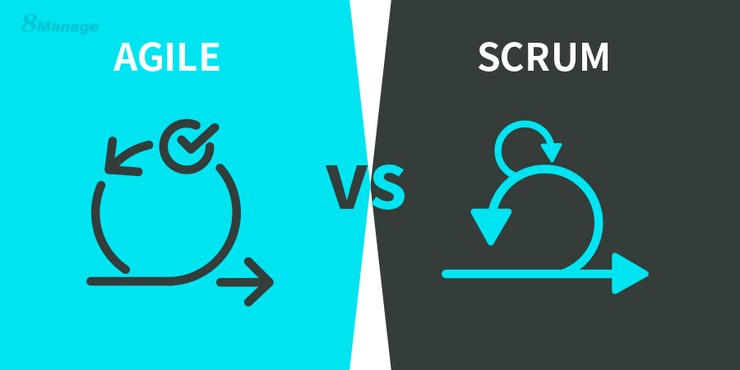In Scrum management, team collaboration is key to project success. However, conflicts within teams are often unavoidable, especially in a fast-paced Agile environment. Effectively managing these conflicts is not only a challenge for the Scrum Master but also an opportunity for the team to improve its efficiency. This article explores the causes of team conflicts, effective resolution strategies, and how project management tools can optimize conflict management. Well also discuss how the 8Manage PM project management system can help address and prevent conflicts, enabling you to build a more efficient Scrum team.

Common Causes of Team Conflicts
1、Unclear Roles and Responsibilities
In the Scrum framework, each role has well-defined responsibilities. However, misunderstandings about ones role or others roles can lead to conflicts. For example, the development team may misinterpret the Product Owners responsibilities, resulting in dissatisfaction with priority decisions.2、Poor Communication
Communication issues are a major source of team conflicts. In a fast-paced iterative environment, delays or inaccuracies in information sharing can easily cause misunderstandings. For instance, differing interpretations of Sprint goals may lead to disagreements.
3、Work Pressure and Uneven Resource Allocation
High-intensity project schedules and limited resources can put immense pressure on team members. When resources are distributed unevenly, some members may have to take on additional workloads, triggering conflicts.
4、Cultural or Personality Differences
Differences in cultural backgrounds or personality traits can also spark conflicts. For example, some team members may prefer direct communication, while others might favor more indirect approaches, leading to misunderstandings.
Effective Strategies for Resolving Team Conflicts
1、Define Team Rules and Goals
Clear team rules and goals are essential to prevent conflicts. The Scrum Master can work with the team to establish guidelines for communication and conflict resolution. Tools like 8Manage PM can help document and track team objectives, ensuring all members have a clear understanding of Sprint plans and delivery targets.
2、Foster Open and Transparent Communication
An open communication environment reduces misunderstandings. The Scrum Master should encourage team members to speak freely during daily stand-ups, Sprint reviews, and retrospectives. The discussion feature in 8Manage PM can record team conversations, minimizing information gaps.
3、Address Conflicts Promptly
Unresolved conflicts can escalate. The Scrum Master needs to quickly identify signs of conflict and take appropriate actions, such as arranging one-on-one discussions or addressing issues in team meetings.
4、Leverage Project Management Tools
Modern project management systems, like 8Manage PM, provide strong support for conflict management:
● Task Assignment and Transparency: Clear task allocation reduces conflicts arising from ambiguous responsibilities.
● Real-time Feedback Mechanism: Team members can report issues in real-time, reducing miscommunication.
● Conflict Recording and Analysis: By analyzing conflict data, the Scrum Master can identify root causes and develop preventive measures.
5、Organize Team-building Activities
Regular team-building activities foster better understanding among members and mitigate conflicts caused by personality differences. For example, casual gatherings or team games after Sprints can help strengthen bonds.
Preventing Team Conflicts
● Conduct Regular Retrospectives: Use Sprint retrospectives to reflect on workflows and team dynamics, making adjustments as needed.
● Provide Professional Training: Offer training on the Scrum framework and communication skills to enhance the teams expertise.
● Balance Workloads: The Scrum Master should monitor resource allocation closely to ensure workload balance.
● Utilize Technology Tools: Choosing the right project management system, such as 8Manage PM, significantly improves team collaboration.

FAQs
1、What is a project management system, and how does it help resolve team conflicts?
A project management system is a software tool designed to plan, organize, and manage projects. By facilitating task assignment, real-time communication, and progress tracking, it helps teams collaborate more effectively. In Scrum management, such systems clarify task allocations and priorities, reducing conflicts caused by information asymmetry.
2、What is the Scrum Master’s role in handling team conflicts?
The Scrum Master acts as a mediator for team conflicts. Their responsibilities include fostering communication, identifying conflict signals, devising solutions, and guiding the team to improve collaboration. Additionally, they can use data analysis features in project management tools to identify root causes of conflicts.
3、How do you choose the right project management system for a Scrum team?
Consider the following factors:
● Functionality: Does the system support Scrum practices like task boards and Sprint management?
● Ease of Use: Is the interface intuitive and easy for team members to adopt?
● Collaboration Features: Does it support real-time communication, file sharing, and feedback?
● Integration Capabilities: Can it integrate seamlessly with other tools like Slack or GitHub?
Team conflicts are inevitable challenges in Scrum management. However, with clear rules, open communication, and the right tools, conflicts can be transformed into opportunities for team growth. By leveraging project management systems, Scrum teams can improve collaboration and continuously optimize their workflows while resolving conflicts effectively.


